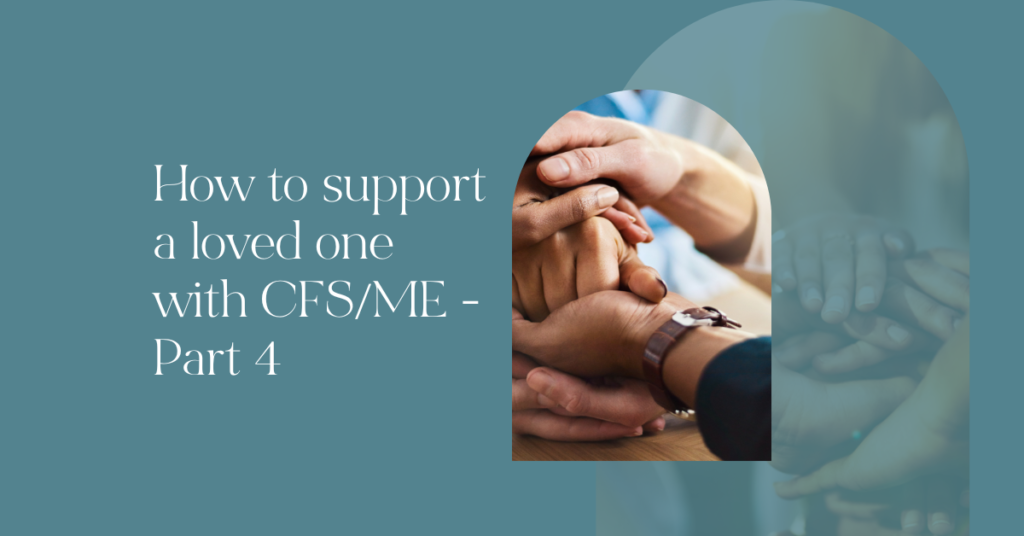This is part 4 of a series pn how to support a loved one with a chronic illness such as CFS/ME. The intentions are specifically to:
- Help the loved ones of those experiencing a chronic illness understand how they can be more supportive.
- Help those who are experiencing a chronic illness to communicate their needs better and allow themselves to receive more help and support in the ways that are meaningful to them.
You can read part 1 here, part 2 here and part 3 here. I suggest reading all parts in order so if you’ve just arrived here. Head back to part 1 and start there.
This next part looks at expectations in the context of how we evaluate our relationships. Miscommunicated expectations can often be the source of dissapointment and feeling unsupported. You’ll learn a frame work to identify blind spots and make sure that your expectations are met more often.
Expectations and The Hierarchy of Relationships
Disappointment or conflict in relationships is usually the product of unmet expectations. One of the frameworks that I teach my clients is called the Hierarchy of Relationships (HORS).
This is based on the understanding that relationships are not classified as just friends, family and work colleagues. We can have work colleagues who feel like family and family members who feel like just acquaintances and therefore it is helpful to have a different way to classify our relationships.
The HORS framework uses the following terms:
- Cabinet; what I call the inner circle. These are the most intimate group of people that you can bear your soul to and feel fully seen and supported.
- Peers; these are relationships with a high degree of intimacy AND specificity. For example, you may share intimate details about your finances with your accountant but you wouldn’t talk to him/her about your gynaecological issues. You may talk in depth with a work colleague about work related issues but you wouldn’t share the most intimate details of your relationship. There may be some friends you share with intimately about some things in your life but not everything is laid on the table, there are some topics which you hold back.
- Friends; these are the light, fun friendships. We enjoy the company of friends but these relationships are not as intimate as the cabinet members and peers.
- Acquaintances; people we know and may chat to from time to time.
- Strangers
Now that you understand the different categories of relationships, the next thing you’ll want to create are the rules or boundaries.
How must someone behave or not behave for them to be in your inner circle? How must a peer behave or not behave? A friend? Acquaintance? Stranger?
What behaviour is expected of them? What are the boundaries of the relationship?
Additionally, how must you behave or not behave in each of these relationships.
You may want to take some time to reflect on this and write down the following for each category:
- What must they do?
- What must they never do?
- What must I do?
- What must I never do?
Here is an example for inner circle:
What must they do?
- They must show an interest in my illness experience and be proactive about reading blogs, books and listening to podcasts.
- They must be proactive with supporting me.
- They must keep in regular contact.
- They must believe in my experience, celebrate my successes and offer encouragement.
- Etc.
What must they never do?
- They must not judge me or shame me for my illness experience.
- They must not give unsolicited advice.
- They must not disrespect my boundaries.
- They must not gaslight my symptoms.
- Etc.
What must I do?
- I must support myself outside of our relationship
- I must be open to receiving support that is offered and giving feedback when support offered is not what I need.
- I must share my experiences, communicate and ask for what I need
- I must communicate my boundaries.
- I must show an interest in their experience, successes and challenges and offer encouragement towards their goals.
- etc.
What must I never do?
- I must not judge or shame them
- I must not give unsolicited advice.
- I must not disrespect their boundaries.
- I must not expect them to always know what I need.
- Etc.
Once you have the rules, you can then assign the people in your life into each category based on how they comply with the rules NOT on where you think they should be.
Where most people go wrong is they just assume that specific people fall in a specific category for many different reasons; you’ve known them a long time, you were close in the past, they were bridesmaid at your wedding etc.
Disappointments happen when we are expecting someone to behave as if they were, for example, inner circle, but when we evaluate the reality of the situation, the relationship may just be on a friend level.
When most people do this exercise they realise they have less people in their inner circle than what they thought. And in case the question is coming up for you; you’ll want your romantic partner, if you have one, to be an inner circle member.
The good news is, we can nurture our relationships so that friends can become peers or peers can become inner circle. Sometimes we can meet a stranger and they can very quickly become our most valued inner circle member.
What has this got to do Chronic Illness?
It’s likely that your illness experience has changed your rules because your needs and expectations have changed. You’ve probably never taken the time to think about this and therefore it is even more unlikely that your inner circle, friends, peers and acquaintances are unaware of the change either.
The consequence is that you may find yourself disappointed, angry and frustrated when your expectations are not met. This may have been happening before your illness experience and the dynamics have now become exacerbated.
This is where all the previous parts come in. There may need to be some re-education around what you expect and what you need. See the previous post about communication and needs.
People come into our lives for a reason, a season or a lifetime.
As you move through your chronic illness experience or navigate your CFS/ME recovery, friends and relationships will change. Some people may nurture themselves up into your inner circle without you even realising. Old inner circle members may become friends or acquaintances.
Your responsibility is to communicate your needs and if someone cannot meet your expectations, it’s okay to change their position in your hierarchy of relationships. This might mean they feel less pressure, you feel less disappointed and let down and this might actually be a temporary requirement for the relationship to grow stronger again in the future.
Making this change might also mean that you don’t need to give as much energy to the relationship (because the rules are different for a friend vs inner circle) and this frees up energy and time for your healing or the relationships that are more important.
This is a lot of work
If you have been reading this post today and the series generally and thinking…
“I already have a chronic illness, I’m tired and foggy brained and now I have to do all this extra work on my relationships”.
I hear you.
This is work. It is also not separate from your healing, it is part of it.
The constant stress of dysfunctional relationships is a stress on your nervous system and a contributing factor in your enjoyment of life.
My words of wisdom are as follows…
Take it one manageable step at a time.
Healing takes time and we can only move as fast as the slowest part. Be kind, gentle and compassionate with yourself and your loved ones as you navigate this journey.
I’d Love Your Feedback?
This series was created through a combination of my coaching and clinical experience, somatic and nervous system training, feedback from my instagram community. I would love to know if you found the information helpful or if there are any challenges or experiences that I didn’t cover or address. Please let me know by leaving a comment or if you prefer you can email me on anna@annamarsh.co.uk
I am willing to make edits and add additional parts so that this can be a comprehensive resource for those in the chronic illness community to share with their loved ones so that they can get the support that they need.










